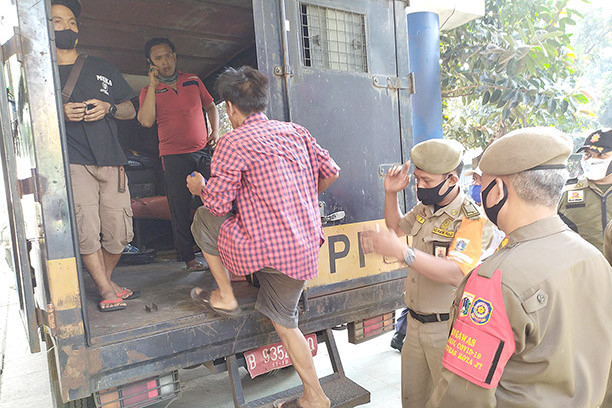Popular Reads
Top Results
Can't find what you're looking for?
View all search resultsPopular Reads
Top Results
Can't find what you're looking for?
View all search resultsJakarta collects Rp 1.1b in fines as end of PSBB transition looms
Change text size
Gift Premium Articles
to Anyone
T
he Jakarta administration is amassing a significant amount of money from city residents who seem not to care about flouting COVID-19 health protocols, as the capital approaches the end of the extended transition from large-scale social restrictions (PSBB) on Thursday.
The number of violations of the protocols in the capital has shot up since the city started relaxing curbs and allowing businesses to reopen on June 5.
The Jakarta Public Order Agency (Satpol PP) said it had collected fines amounting to Rp 1.1 billion (US$78,571) from businesses and individuals that ignored health protocols during the transition up until July 24.
Of that figure, around 60 percent, some Rp 664 million, was collected from the 4,094 individuals caught without masks in public, while the remainder was sourced from businesses and arts and cultural performances that failed to follow the necessary protocols for operations.
According to Jakarta Gubernatorial Decree No. 51/2020, people are obliged to wear masks in public during the social restrictions period. Those who violate the rules must pay a fine of Rp 250,000 or are forced to take on community service assignments if they decline to pay up.
Some 37,500 people who were caught without masks decided to do the latter, mostly because they could not afford the fines.
“So, in total, we have punished around 41,000 people for not wearing masks since the administration allowed for the gradual reopening of businesses, known as the transition from PSBB,” Jakarta Satpol PP head Arifin told The Jakarta Post on Tuesday.
“This is a disappointing number, to be honest, because the level of public compliance with health protocols got worse after the administration relaxed social restrictions,” he said.
During the strict regime of curbs between April 10 and June 4, the agency had punished just 10,000 individuals for not wearing masks, Arifin said.
At the time, Satpol PP would impose one of three kinds of sanctions for violators: a written reprimand, mandatory community service or a fine of Rp 100,000 or Rp 250,000.
Arifin did not elaborate on the details of that period, but said the agency had succeeded in collecting around Rp 800 million in fines during the stricter social restrictions period, and that the contribution from people not wearing masks did not exceed half of the total amount in fines.
The official said that people may have misinterpreted the easing of social restrictions as a sign that things could go back to normal, which in turn caused a spike in violations of rules like wearing masks in public.
Others may also have been fed up with the stay-at-home order that has been in force for the past few months.
“But we promise to take stern action against people not wearing masks. We have launched an operation since last week called OK Prend, in which our officers monitor public compliance even in places like dense residential areas,” he said.
Recent surveys have seemingly confirmed that the majority of people may be feeling worn out by the strict curbs. Jakarta-based pollster Indikator Politik Indonesia found in its recent survey that 60.6 percent out of 1,200 respondents across the country – including in the capital – say they have had enough of the implementation of the PSBB.
But public health experts have warned the administration not to put the blame squarely on the public for the rise in health protocol violations.
“More people have been violating health protocols because the administration itself has been treating the transition from the PSBB as a large-scale reopening [of the economy],” said Hermawan Saputra of Muhammadiyah Prof. Dr. Hamka University.
“Jakarta is technically still under social restrictions, but in practice, all activities seem to be back to normal,” he said. “The administration has been inconsistent in implementing PSBB curbs. No wonder that it has prompted the public to ignore health protocols.”
Baequni, head of the Indonesian Public Health Experts Association’s (IAKMI) Jakarta chapter, said the city should educate the public at the grassroots level in order to undo its mistake of “unintentionally” letting the public violate health protocols.
He said the administration should deploy health professionals to each community unit (RW) and work closely with prominent local figures to underline the importance of compliance.
“This would make for a better ‘psychological’ deterrent on compliance, rather than threatening people with sanctions,” he said.
The increase in protocol violations comes off the back of emerging infection clusters in the capital’s central business districts, and just days before the end of the second phase of transition from the PSBB on Thursday.
Deputy Jakarta governor Ahmad Riza Patria said the administration was currently evaluating the policy. “We’re evaluating it over these two days; we have three options,” he said on Tuesday, as quoted by tempo.co.
If there is a marked improvement in the current circumstances, the city administration may continue easing restrictions and lift the PSBB altogether.
If the rate of infection remains as it is currently, despite the high number of cases, city officials may choose to extend the transitional phase once more.
“But if the situation worsens then it is possible that we may reinstate [full-fledged] PSBB,” Riza said.
The Health Ministry announced 2,381 new confirmed COVID-19 cases on Wednesday, bringing the total number of infections nationwide to 104,432. Of that figure, the capital recorded 577 new confirmed cases, nearly a quarter of all new cases, bringing the total tally citywide to 20,572.
The national COVID-19 task force said on Tuesday that all five municipalities of Jakarta have been designated as "red zones" – areas where the risk of COVID-19 infection is still high.










